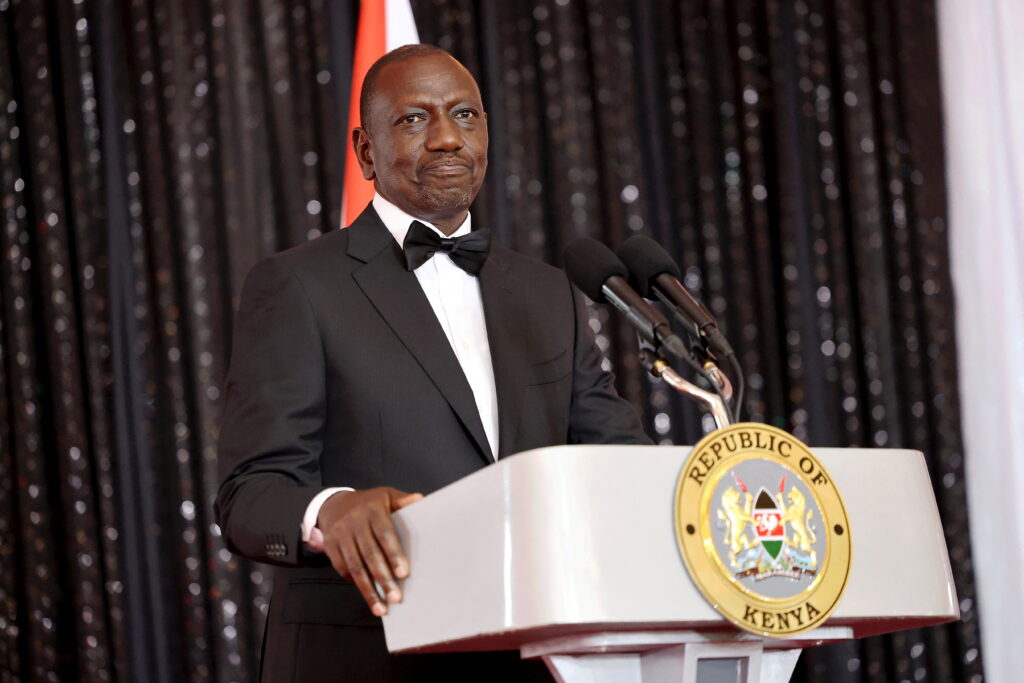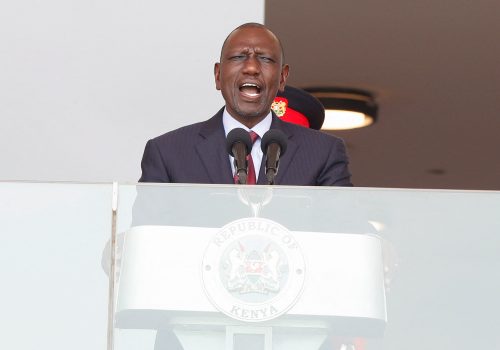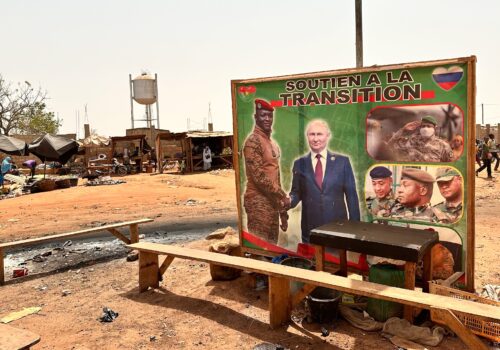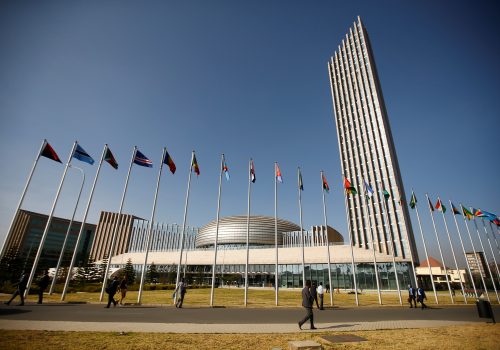Kenyan President William Ruto’s arrival today for his state visit to Washington symbolizes much more than the sixtieth anniversary of US-Kenya diplomatic relations. For the United States, this visit is a chance to reaffirm ties with one of its oldest and most trusted partners in Africa and to reset wider regional relations. Ruto is the first African head of state to be hosted for a state visit since 2008. For Kenya, the visit offers an important opportunity to solidify a partnership that could benefit the country’s foreign policy ambitions and strong-but-growing economy.
But just as important as Ruto’s visit to the United States is how soon the US president visits Nairobi in return. Such a visit is vital to keep momentum up on several important ongoing initiatives by the two countries. The danger to avoid here is that, as soon as Ruto boards the plane back to his country, US attention on Kenya and Africa falls away again.
Trade, climate, and security on the agenda
On a continent where the United States and European allies are struggling to maintain historic partnerships, Nairobi is an enthusiastic partner in security and trade. These will undoubtedly be a focus of Ruto’s visit this week.
Since 2022, the United States and Kenya have been working on a Strategic Trade and Investment Partnership, which has been supported by recent visits by US Trade Representative Katherine Tai and US Secretary of Commerce Gina Raimondo to Nairobi. A Free Trade Agreement between Kenya and the United States was under discussion during the Trump administration, but it was halted during the COVID-19 pandemic. More recently, House Democrats introduced the US-Africa Strategic Trade and Investment Partnership Act this month.
For Kenya, a new trade agreement would be a shift away from the “Look East” policy that previous Kenyan presidents followed in search of investment. Kenya, for example, partnered with China on a new railway connecting Nairobi and Mombasa, as well as on a prominent expressway project, during President Uhuru Kenyatta’s administration. In contrast, Ruto may discuss funding for the construction of a new two billion dollar international airport in Nairobi with US partners during his visit to Washington. Bringing in the United States as the main financier for this project would challenge China as Kenya’s primary partner for large infrastructure projects.
Regarding security, Kenya has put forward a plan to lead a police mission to Haiti to help stabilize the country following widespread violence by rival gangs and a collapse of the government’s authority. Kenya’s judiciary has so far blocked the plan, but Haiti will likely nonetheless be on the agenda for both leaders. In preparation for the arrival of a Multinational Security Support Mission in Haiti led by Kenya, the US military has been providing extensive logistical support on the ground. The United States had previously pledged a hundred million dollars in support of the mission. Kenya’s Defense Minister Aden Bare Duale also visited the Pentagon in February and, in the same month, Kenya hosted US Africa Command’s largest exercise in East Africa. All of these developments indicate that a greater degree of security cooperation between the two countries is possible.
No major breakthroughs during Ruto’s visit this week are expected, though it is possible. Nonetheless, the past few months already indicate that Washington and Nairobi are making steady, gradual progress on trade and security initiatives. Climate—which Ruto has championed since the start of his presidency—will likely be another important focus. His state visit is an opportunity to focus attention on these initiatives to continue this progress. The challenge, then, is to make sure that this week builds momentum on these initiatives that continues into the weeks and months ahead.
The wider US-African relationship
But Ruto’s visit must also be seen in terms of broader US-African relations, the course of which has not run smoothly in recent years.
The United States was caught flatfooted by the outbreak of civil war in Sudan in 2023. Its forces have been expelled—and in some cases replaced by Russian forces—or asked to leave from Niger and Chad. And opinion polls show that the United States has lost its historic leadership in Africa. South Africa’s relations with the United States, for instance, are strained over Israel’s campaign in Gaza, leaving the two countries at odds. These events also come at a time when the Brazil, Russia, India, China, and South Africa grouping known as BRICS is expanding in Africa, gaining Egypt and Ethiopia as partners in its goal to build an increasingly multipolar world. All these are potentially affronts to US standing in Africa.
A reset in US policy toward Africa is desperately needed.
In the White House announcement of Ruto’s visit, Press Secretary Karine Jean-Pierre was eager to highlight and reaffirm the principles set forth during the 2022 US-Africa Leaders Summit. During this summit, the Biden administration pledged that it is all in on Africa. It also made clear that under its strategy toward sub-Saharan Africa, it would seek equal partnership with African nations, regardless of their ties with other powers. At the conclusion of the summit, in front of the assembled visiting leaders and delegations, US President Joe Biden pledged to visit Africa in 2023.
This has had an effect, and while the Biden administration is right to tout an impressive lineup of senior US officials and cabinet members who did make the trip to the continent in 2023, the fact remains that the president’s pledge was left unfulfilled.
It is also worth noting that while both the leading Republican and Democrat in the House Foreign Affairs Committee requested that Ruto be issued an invitation to address a joint session of Congress, Speaker Mike Johnson declined to issue the invitation. In the past several years, leaders from Japan, Israel, India, Ukraine, and South Korea have addressed a joint meeting of Congress. But much like Biden’s travel itinerary, Africa is again left off the list.
Equally as important to Ruto’s visit to Washington is Biden’s visit to Nairobi—or to another African capital—soon. While this would be particularly challenging in an election year, fulfilling his pledge as soon as possible would be a much-needed step. It would be a symbol of Africa’s importance to US interests and help move substantive issues in US-Africa relations forward. When it comes to Africa, where policy has a tendency to get stuck or move too slowly, a US presidential visit can be a forcing mechanism to move important projects forward.
Ruto’s state visit this week is very much welcomed by Africa watchers and policymakers, but it serves to keep US-Africa relations on life support. New approaches, further engagement, and firm commitments that bear results are sorely needed.
Sibi Nyaoga is a program assistant at the Atlantic Council’s Africa Center.
Alexander Tripp is the assistant director for the Atlantic Council’s Africa Center.
Further reading
Thu, Dec 21, 2023
What Kenya’s proposed mission to Haiti says about Nairobi’s foreign policy
AfricaSource By
Success in Ruto’s foreign policy approach depends, in part, on the success of this mission to Haiti—one that will be hard to come by.
Wed, May 1, 2024
With Africa’s minerals in demand, Russia and the US each offer what the other can’t
AfricaSource By Alexander Tripp
African countries must choose wisely between the United States and Russia in their search for a partner on critical minerals.
Tue, Apr 2, 2024
Why Africans hold the future of global democracy in their hands
AfricaSource By Rama Yade
By the end of 2024, the face of political Africa will—theoretically—no longer be the same. With nineteen elections scheduled this year, the continent will see presidents leave who were elected more than ten years ago (in Senegal and Ghana), uncertain civilian transitions (in Chad, Mali, and Burkina Faso), high-stakes elections (as in South Africa), and […]
Image: NAIROBI, KENYA - OCTOBER 31: William Ruto, President of the Republic of Kenya, gives a speech a State Banquet at State House. Jackson/Pool via REUTERS



